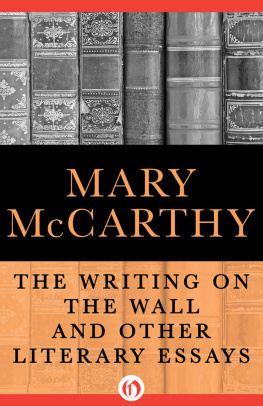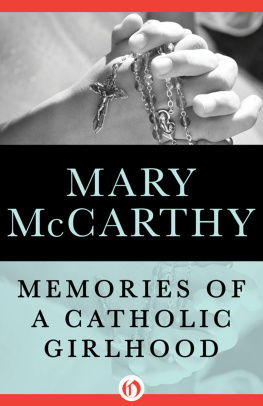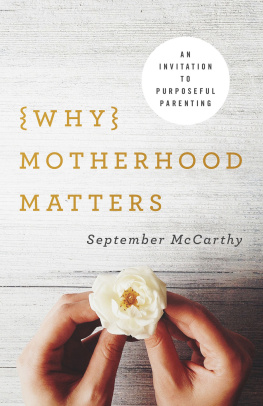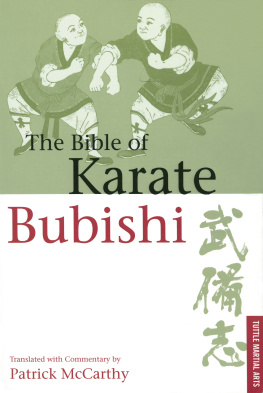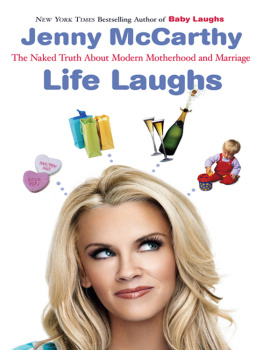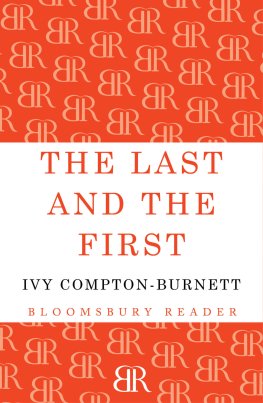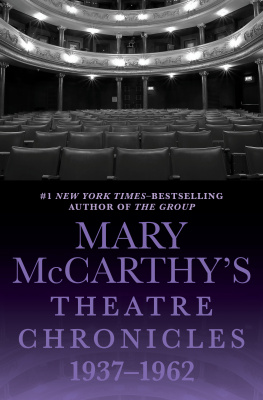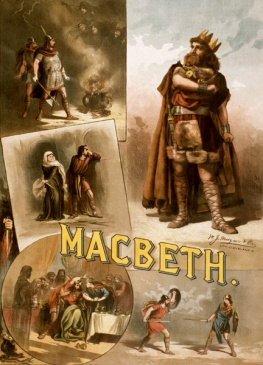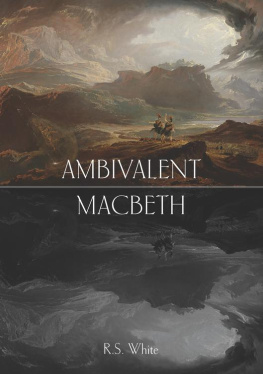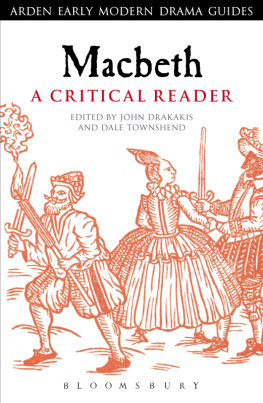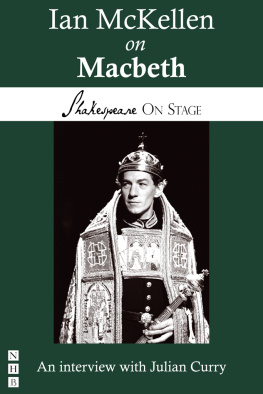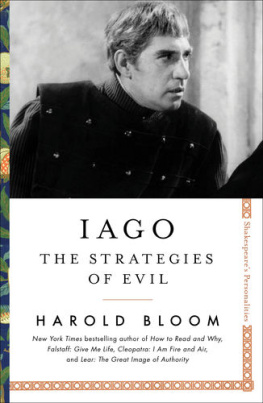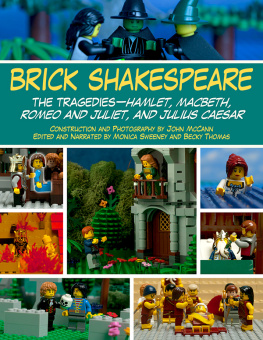
The Writing on the Wall
And Other Literary Essays
Mary McCarthy

Cui dono lepidum nouum libellum
Arido modo pumice expolitum?
To William Jovanovich
with love
General Macbeth
HE IS A GENERAL and has just won a battle; he enters the scene making a remark about the weather. So foul and fair a day I have not seen. On this flat note Macbeths character tone is set. Terrible weather were having. The sun cant seem to make up its mind. Is it hot/cold/wet enough for you? A commonplace man who talks in commonplaces, a golfer, one might guess, on the Scottish fairways, Macbeth is the only Shakespeare hero who corresponds to a bourgeois type: a murderous Babbitt, let us say.
You might argue just the opposite, that Macbeth is over imaginative, the prey of visions. It is true that he is impressionable. Banquo, when they come upon the witches, amuses himself at their expense, like a man of parts idly chaffing a fortune-teller. Macbeth, though, is deeply impressed. Thane of Cawdor and King. He thinks this over aloud. How can I be Thane of Cawdor when the Thane of Cawdor is alive? When this mental stumbling-block has been cleared away for him (the Thane of Cawdor has received a death sentence), he turns his thoughts sotto voce to the next question. How can I be King when Duncan is alive? The answer comes back, Kill him. It does fleetingly occur to Macbeth, as it would to most people, to leave matters alone and let destiny work it out. If chance will have me King, why, chance may crown me, Without my stir. But this goes against his grain. A reflective man might wonder how fate would spin her plot, as the Virgin Mary must have wondered after the Angel Gabriels visit. But Macbeth does not trust to fate, that is, to the unknown, the mystery of things; he trusts only to a known quantityhimselfto put the prophecy into action. In short, he has no faith, which requires imagination. He is literal-minded; that, in a word, is his tragedy.
It was not his idea, he could plead in self-defense, but the witches, that he should have the throne. They said it first. But the witches only voiced a thought that was already in his mind; after all, he was Duncans cousin and close to the crown. And once the thought has been put into words, he is in a scrambling hurry. He cannot wait to get home to tell his wife about the promise; in his excitement, he puts it in a letter, which he sends on ahead, like a businessman briefing an associate on a piece of good news for the firm.
Lady Macbeth takes very little stock in the witches. She never pesters her husband, as most wives would, with questions about the Weird Sisters: What did they say, exactly? How did they look? Are you sure? She is less interested in fate and metaphysical aid than in the business at handhow to nerve her husband to do what he wants to do. And later, when Macbeth announces that he is going out to consult the Weird Sisters again, she refrains from comment. As though she were keeping her opinionO proper stuff!to herself. Lady Macbeth is not superstitious. Macbeth is. This makes her repeatedly impatient with him, for Macbeth, like many men of his sort, is an old story to his wife. A tale full of sound and fury signifying nothing. Her contempt for him perhaps extends even to his ambition. Wouldst not play false, And yet wouldst wrongly win. As though to say, All right, if thats what you want, have the courage to get it. Lady Macbeth does not so much give the impression of coveting the crown herself as of being weary of watching Macbeth covet it. Macbeth, by the way, is her second husband, and either her first husband was a better man than he, which galls her, or he was just another general, another superstitious golfer, which would gall her too.
Superstition here is the opposite of reason on the one hand and of imagination on the other. Macbeth is credulous, in contrast to Lady Macbeth, to Banquo, and, later, to Malcolm, who sets the audience an example of the right way by mistrusting Macduff until he has submitted him to an empirical test. Believing and knowing are paired in Malcolms mind; what he knows he believes. Macbeths eagerness to believe is the companion of his lack of faith. If all works out right for him in this world, Macbeth says, he can take a chance on the next (Wed jump the life to come). Superstition whispers when true religion has been silenced, and Macbeth becomes a ready client for the patent medicines brewed by the jeering witches on the heath.
As in his first interview with them he is too quick to act literally on a dark saying, in the second he is too easily reassured. He will not be conquered till great Birnam Wood to high Dunsinane Hill shall come against him. Why, that can never happen! he cries out in immediate relief, his brow clearing.
It never enters his mind to examine the saying more closely, test it, so to speak, for a double bottom, as was common in those days (Banquo even points this out to him) with prophetic utterances, which were known to be ambiguous and tricky. Any child knew that a prophecy often meant the reverse of what it seemed to say, and any man of imagination would ask himself how Birnam Wood might come to Dunsinane and take measures to prevent it, as King Laius took measures to prevent his own death by arranging to have the baby Oedipus killed. If Macbeth had thought it out, he could have had Birnam Wood chopped down and burned on the spot and the ashes dumped into the sea. True, the prophecy might still have turned against him (since destiny cannot be avoided and the appointment will be kept at Samarra), but that would have been another story, another tragedy, the tragedy of a clever man not clever enough to circumvent fate. Macbeth is not clever; he is taken in by surfaces, by appearance. He cannot think beyond the usual course of things. None of woman born. All men, he says to himself, sagely, are born of women; Malcolm and Macduff are men; therefore I am safe. This logic leaves out of account the extraordinary: the man brought into the world by Caesarean section. In the same way, it leaves out of account the supernaturalthe very forces he is trafficking with. He might be overcome by an angel or a demon, as well as by Macduff.
Yet this pedestrian general sees ghosts and imaginary daggers in the air. Lady Macbeth does not, and the tendency in her husband grates on her nerves; she is sick of his terrors and fancies. A practical woman, Lady Macbeth, more a partner than a wife, though Macbeth treats her with a trite domestic fondnessLove, Dearest love, Dearest chuck, Sweet remembrancer. These middle-aged, middle-class endearments, as though he called her Honeybunch or Sweetheart, as well as the obligatory Dear, are a master stroke of Shakespeares and perfectly in keeping with the prosing about the weather, the heavy credulousness.
Naturally Macbeth is dominated by his wife. He is old Iron Pants in the field (as she bitterly reminds him), but at home she has to wear the pants; she has to unsex herself. No chucks or dearests escape her tightened lips, and yet she is more feeling, more human finally than Macbeth. She thinks of her father when she sees the old King asleep, and this natural thought will not let her kill him. Macbeth has to do it, just as the quailing husband of any modern virago is sent down to the basement to kill a rat or drown a set of kittens. An image of her father, irrelevant to her purpose, softens this monster woman; sleepwalking, she thinks of Lady Macduff. The Thane of Fife had a wife. Where is she now? Stronger than Macbeth, less suggestible, she is nevertheless imaginative, where he is not. She does not see ghosts and daggers; when she sleepwalks, it is simple reality that haunts herthe crime relived. Yet, who would have thought the old man to have had so much blood in him? Over and over, the epiphenomena of the crime present themselves to her dormant consciousness. This nightly reliving is not penitence but more terribleremorse, the agenbite of the restless deed. Lady Macbeths uncontrollable imagination drives her to put herself in the place of othersthe wife of the Thane of Fifeand to recognize a kinship between all human kind: the pathos of old age in Duncan has made her think, Why, he might be my father! This sense of a natural bond between men opens her to contritionsorrowing with. To ask whether, waking, she is sorry for what she has done is impertinent. She lives with it and it kills her.
Next page
